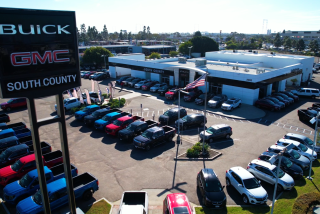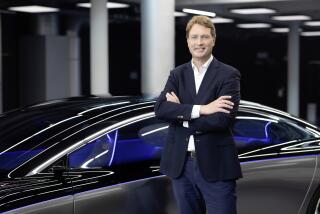Hyundai Equus may have rough ride into luxury market
- Share via
At first glance it’s hard to discern who made this new luxury car. The long sloping hood evokes a Mercedes-Benz S class. The bisected grill bears a touch of the BMW 7 series. The galloping horse hood badge hints of the “winged B” on a Bentley.
With a dark burled wood dash and steering wheel, soft leather upholstery and brushed metal accents, the spacious interior oozes opulence. The driver’s seat has a built-in massage system. The back seat offers a refrigerated compartment to keep drinks cool. A powerful 4.6-liter, V-8 engine with 385 horsepower sits under the hood. No less than nine airbags keep passengers safe.
0nly the “Flying H” corporate logo on the trunk lid gives any clue to the car’s origin. Is America ready for a $60,000 luxury car from South Korea?
That the question would even be asked represents a remarkable turnaround for an automaker that once produced some of the worst cars sold in America. Underpowered and unreliable, the early Hyundais first introduced in the U.S. in the late-1980s were inexpensive and sold briskly until people learned just how bad the autos were. Similar dependability issues chased import brands such as Renault and Fiat from the U.S. market, but not South Korea’s Hyundai Motor Co.
Tenacity combined with the introduction of new vehicle designs have spurred sales, improved reliability and sparked consumer interest. Hyundais are now thought of as well-built, utilitarian autos with a touch of stylish pizazz. This has set the stage for the launch of the Equus, a luxury car designed to compete with the likes of the top Mercedes and Lexus sedans. It goes on sale in November.
The success of Lexus, Acura and Infiniti — divisions of Toyota Motor Corp., Honda Motor Co. and Nissan Motor Co, respectively — “shows that Americans aren’t as brand loyal as traditional luxury automakers assumed,” said Eric Noble, president of CarLab, an automotive product and design consulting firm in Orange.
“The reality is that the same people — namely baby boomers — who made Lexus a success are the same people who will make any competent luxury carmaker a success in the United States,” Noble said.
Despite its improved image, Hyundai still faces hurdles moving into the refined luxury market.
Recently, Hyundai has made progress moving upscale with its line of Genesis sedans and coupes, which sell in the high-$20,000 to mid-$30,000 range, depending on trim levels. Yet even at that price point some owners attempt to hide who built the vehicle by replacing the Hyundai logo on the trunk lid with a winged Genesis badge that dealers sell from their parts department.
Len Wahlert, a retired aerospace executive, BMW driver and former Lexus owner, said the swap is pretty common among the retirement crowd in La Quinta. And that’s one reason he thinks the automaker would have trouble selling cars at roughly twice the price.
“People who shop for cars at $50,000 or more won’t buy a Korean car now,” Wahlert said. “I think they will find that shifting up has a ceiling.”
Hyundai wants to corral shoppers such as Brian and Shelley Kadison of Beverly Hills. The Kadisons are about to replace a Mercedes CLS550 that comes off lease early next year. They’re looking to lease vehicles that retail in the $75,000 to $85,000 range, such as the Porsche Panamera sedan, another Mercedes and perhaps a Jaguar.
Although he knows about Equus, it’s not on his list, said Brian Kadison, a business consultant.
“My impression of Hyundai is that they make a decent car and that quality has improved dramatically over the last five or six years. I would look at an Equus as a curiosity but wouldn’t consider it until it had a track record,” he said.
Hyundai isn’t helping itself by not spending to establish a separate dealer network for Equus, something that could turn out to be a “fatal flaw,” auto consultant Noble said. Hyundai will sell the line at about 250 of its roughly 800 dealers. The car will be sequestered in a separate section or wing of each showroom, often with the Genesis cars, but even the densest of shoppers will know they are at a Hyundai dealership. Lexus and the other luxury spinoffs of Asian automakers set up separate dealership networks and offer employees special sales and service training designed to appeal to wealthy customers.
“True luxury buyers expect more than product. They expect a luxury sales and service experience, and there is no real way to do that through Hyundai dealers,” Noble said. “If you look at Lexus, everything that Hyundai needs to do is all there. It is an irony because it has been argued for a long time that Hyundai always copies Toyota, but here is a case where it doesn’t.”
Hyundai knows that’s a risk and has come up with an innovative solution, said John Krafcik, chief executive of Hyundai Motor America.
Shoppers won’t ever have to set foot in a dealership to purchase or even service their Equus. Hyundai will bring the vehicle to their home for a test drive. Service is valet-style — Hyundai will get the car and drop off a loaner until the owner’s car is returned. Appointments can be made electronically through the Apple iPad that serves as the owner’s manual and is included with each Equus lease or purchase.
The automaker is looking for what Krafcik calls “affluent pragmatists — Costco shoppers who will also go on a two-week European vacation.”
He said these are the people who made Lexus a top luxury nameplate. He believes Hyundai will also take advantage of a recession-stoked “social stigma” associated with driving expensive German luxury autos such as high-end Mercedes and BMW sedans.
The company has set the goal posts low. Hyundai expects to sell just 2,000 to 3,000 Equus cars in 2011. That’s about the same number of Genesis models Hyundai sells in a month, and barely a quarter of the volume of rivals such as the BMW 7 series, the Mercedes S-Class and the Lexus LS 460.
Hyundai is launching the vehicle at a time when the brand is gaining traction in the U.S. market. Just a decade ago, barely 7% of car buyers said they would consider purchasing the South Korean brand. That has risen to 33% now, according to market research firm GfK Group. Hyundai recently climbed into Kelley Blue Book’s top five most-considered auto brands among new-car shoppers, pushing Nissan into sixth place. After scoring among the worst manufacturers for both initial quality and long-term dependability for years, Hyundai now consistently beats the industry averages, according to J.D. Power & Associates.
Savvy marketing moves have also helped the automaker.
When sales dwindled to just 90,000 by 1998 under the crush of quality problems, Hyundai considered abandoning the market. It gave the U.S. one last shot by developing a program to coax consumers into purchases by offering one of the best warranty programs in the industry. Starting with the 1999 model year, Hyundai provided a transferable bumper-to-bumper warranty for five years and up to 60,000 miles. It guaranteed the power train for 10 years or 100,000 miles. The automaker also promised buyers five years of roadside assistance.
To back up the warranty, the company engineers had to design longer-lasting components, particularly the engines and the transmissions.
Chris Hosford, a Hyundai spokesman who has worked for the automaker since 1996, said this just wasn’t a simple repair of one system or an unreliable component.
“That would have been much easier and we could have fixed it faster,” Hosford said.
Hyundai engineers looked at virtually every component that went into the vehicles and redesigned the parts that were failing, he said. They then used what they learned from that experience to improve Hyundais that were under development.
When Hyundai faced a recession-caused sales decline in 2009, it built on its earlier marketing efforts by adding a loss-protection program. Buyers who financed their vehicles with Hyundai and made the first two car payments could return the car without damage to their credit rating if they lost their job during the first year of ownership. Hyundai would absorb as much as $7,500 in lost equity. The program helped secure buyers nervous about the economy and hasn’t cost the automaker much. Only 100 people returned their vehicles during the first year.
“To get people to buy your car you have to get people to trust you,” Krafcik said. “We want people to think, ‘Hyundai — they just take care of you.’ ”
These moves have paid off. Through the first eight months of this year, Hyundai sales rose 17% to 363,491 vehicles. Its market share in August was 5.4%, making it the sixth-largest auto seller in the U.S. It will likely top 500,000 in annual vehicle sales for the first time in its 24 years in the U.S. market.
Industry executives expect Hyundai will attack the luxury market with the same stubbornness that kept it alive in the U.S. when other import brands fled.
“When I was there people were asking whether Americans would buy a $20,000 Hyundai. This is the next step in the expansion of the product line, and they will find a niche in the market,” said Finbarr O’Neill, now president of J.D. Power & Associates. He headed Hyundai’s U.S. operations from 1998 through 2003, a time when the automaker was already figuring out how to move upscale.
And even if the company makes a few missteps along the way, it’s shown in the past that it could make the right moves to correct its course, O’Neill said.
Krafcik agrees: “This is the hardest working car company on the planet. We just do not give up.”
jerry.hirsch@latimes.com







